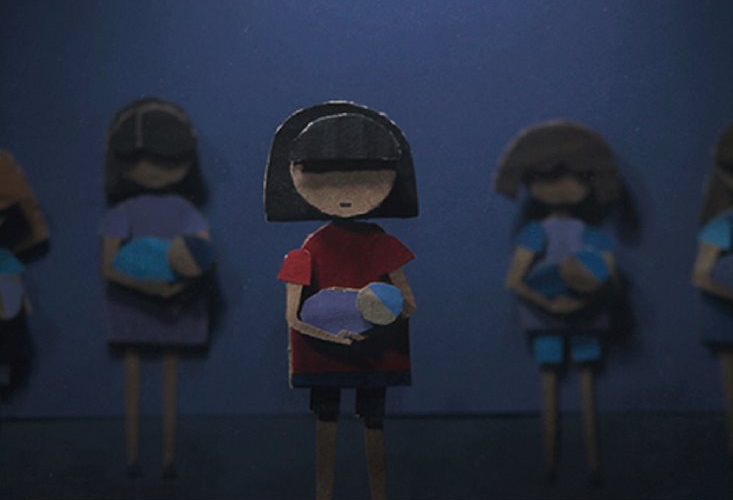MACHISMO MISOGYNY
Paraguay: Girls face sexual violence, pregnancies and impunity in a labyrinth with no way out
Bichofeo Estudio/Amnesty International
December 1, 2021
Girls who are survivors of sexual violence in Paraguay face a confusing path of obstacles to rebuilding their lives and obtaining justice in a country where authorities ignore their voices, force them to carry pregnancies resulting from rape to term, while failing to listen to the expert opinions of their own professionals on sexual violence, Amnesty International concluded in a new report released today.
“By action and omission, Paraguay is turning its back on its girls and teenagers as they face unimaginable abuses. Although on paper there is a legal framework to support survivors of sexual violence, in practice they are at the mercy of a chaotic system that does not listen to them or prioritize their well-being and instead focuses on forcing girls to carry pregnancies to term,” said Erika Guevara-Rosas, Americas Director at Amnesty International.
The report, titled in Guaraní Mitãkuña ndaha’eiva’erã sy (They are girls, not mothers), analyses the failures of the system that exists in Paraguay to address cases of sexual violence against children and teenagers based on the experiences of a large number of professionals in the fields of health, education and justice.
The crisis is monumental. In 2019 alone, the Public Prosecutor’s Office received, on average, 12 reports of sexual violence against children and teenagers every day. Experts estimate that for every two cases they know of, there may be at least 10 others.
Most take place in the family environment and, in some cases, the abuse results in pregnancy. In fact, in Paraguay, an average of two girls between the ages of 10 and 14 give birth every day. At least 1,000 girls aged 14 and under gave birth in Paraguay between 2019 and 2020. In addition, more than 12,000 teenage girls between the ages of 15 and 19 gave birth in 2019. Many of these pregnancies may also have been the result of sexual violence, lack of comprehensive sexual education, inadequate information on prevention of early pregnancy or insufficient access to sexual and reproductive health services.
For girls, options are often very limited, despite the enormous risks that early childbirth can pose to their bodies and lives – girls under the age of 15 are four times more likely to die from pregnancy-related complications, in addition to being at greater risk of premature birth.
Forcing someone to continue with a pregnancy, particularly when it is the result of rape, is a form of ill-treatment that can be considered tortureErika Guevara-Rosas, Americas Director at Amnesty International
Paraguay continues to have some of the most restrictive laws in the Americas regarding access to safe and legal abortion. Termination of pregnancy is a crime punishable by imprisonment, with the exception of cases where the pregnant woman’s life is in danger.
Without options, many girls end up living with their abusers or in children’s homes where they are often pressured to become mothers, and are subjected to further abuse, deprived of any possibility of a quality education and dignified life plans.
As a consequence of not listening to the professionals’ response to sexual violence in girls and teenagers, Paraguayan authorities are not promoting early detection, are not providing comprehensive sexual education with a gender focus and are not coordinating and streamlining their response to avoid secondary revictimization.
“Girls have the right to a life free of violence. Forcing someone to continue with a pregnancy, particularly when it is the result of rape, is a form of ill-treatment that can be considered torture,” said Erika Guevara-Rosas. “Despite some legislative advances in recent years, Paraguay has failed to put in place sufficient measures to protect the most vulnerable people in society.”
In 2018, Paraguay adopted Law 6202 to prevent sexual abuse and guarantee comprehensive care for child and teenage survivors. However, almost three years later, the roadmap for its implementation has not yet been finalized.
The authorities are also turning their back on Comprehensive Sexual Education, a key element for the prevention of early pregnancies. Although the Childhood and Adolescence Code recognizes its importance, in 2011, the authorities stopped its implementation. In 2017, the Ministry of Education and Science banned “the dissemination and use of materials…referring to gender theory and/or ideology, in educational institutions.”
Paraguay has failed to put in place sufficient measures to protect the most vulnerable people in societyErika Guevara-Rosas, Americas Director at Amnesty International
“Paraguayan authorities must immediately introduce Comprehensive Sexual Education to ensure that girls, boys and teenagers have the necessary skills to speak out if they are threatened by sexual violence,” said Erika Guevara-Rosas.
“They must also finalize the long-awaited single pathway to provide comprehensive care for survivors of sexual abuse and prevent chronic secondary victimization and put in place a national programme to support those who become pregnant and are forced to carry the pregnancy to term, to help them rebuild their lives and overcome the severe long-term damage that sexual violence can inflict.”
For more information duncan.tucker@amnesty.org
No comments:
Post a Comment